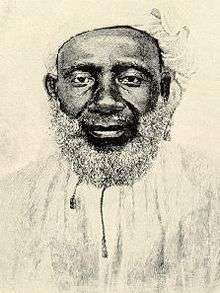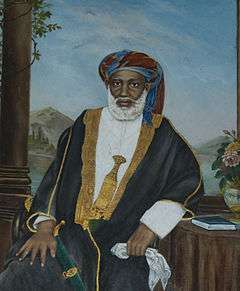Tippu Tip
| Tippu Tip | |
|---|---|
 | |
| Born |
Hamad bin Muhammad bin Juma bin Rajab el Murjebi 1832 Zanzibar |
| Died |
June 14, 1905 Stone Town, Zanzibar |
| Occupation | Slave trader, ivory merchant, explorer, governor |
Tippu Tip, or Tib (1832 – June 14, 1905), real name Hamad bin Muhammad bin Juma bin Rajab el Murjebi, was a Swahili-Zanzibari slave trader. An ivory trader, explorer, plantation owner and governor, he worked for a succession of the sultans of Zanzibar. Tippu Tip traded in slaves for Zanzibar's clove plantations. As part of the large and lucrative ivory trade, he led many trading expeditions into Central Africa by constructing profitable trading posts that reached deep into the region. He bought the ivory from local suppliers and resold it for a profit at coastal ports.
Early life
It is believed that Tippu Tip was born around 1832 on Zanzibar, based on descriptions of his age at points in his life.[1] Tippu Tip's mother, Bint Habib bin Bushir, was a Muscat Arab of the ruling class. His father and paternal grandfather were coastal Swahili who had taken part in the earliest trading expeditions to the interior. His paternal great-grandmother, wife of Rajab bin Mohammed bin Said el Murgebi, was the daughter of Juma bin Mohammed el Nebhani, a member of a respected Muscat (Oman) family, and a Bantu woman from the village of Mbwa Maji, a small village south of what would later become the German capital of Dar es Salaam.[2] Tip himself was purportedly of well-bred carriage, with a "Negroid" countenance.[3]
At a relatively young age he led a group of about 100 men into Central Africa for slaves and ivory.[1] After plundering several large swathes of land he returned to Zanzibar to consolidate his resources and recruit for his forces. Following this he returned to mainland Africa.[4]
Nickname
Throughout his lifetime Hamad bin Muhammad bin Juma bin Rajab el Murjebi was more commonly known as Tippu Tib, which translates to "the gatherer together of wealth." Some theories suggest that the nickname originated with Africans who said that the guns his forces carried sounded like "tip-u-tip-u-tip."[1]
Later life

Tippu Tip built himself a trading empire that he then translated into clove plantations on Zanzibar. Abdul Sheriff reported that when he left for his twelve years of "empire building" on the mainland, he had no plantations of his own. By 1895, he had acquired "seven 'shambas' [plantations] and 10,000 slaves."[5]
He met and helped several famous western explorers of the African continent, including David Livingstone and Henry Morton Stanley.[6]:Vol. Two,91–97 Between 1884 and 1887 he claimed the Eastern Congo for himself and for the Sultan of Zanzibar, Bargash bin Said el Busaidi. In spite of his position as protector of Zanzibar's interests in Congo, he managed to maintain good relations with the Europeans. When, in August 1886, fighting broke out between the Swahili and the representatives of King Leopold II of Belgium at Stanley Falls, al-Murjabī went to the Belgian consul at Zanzibar to assure him of his "good intentions." Although he was still a force in Central African politics, he could see by 1886 that power in the region was shifting. In early 1887, Stanley arrived in Zanzibar and proposed that Tippu Tip be made governor of the Stanley Falls District in the Congo Free State. Both Leopold and Sultan Barghash bin Said agreed and on February 24, 1887, Tippu Tip accepted.[7] At the same time, he also agreed to man the expedition which Stanley had been commissioned to organize for the purpose of rescuing Emin Pasha (E. Schnitzer), a German condottiere in the service of Egypt who had been stranded in the Bahr el Ghazal area as a result of the Mahdist uprising in Sudan.

Tippu Tip traveled back to the Upper Congo in the company of Stanley, but this time by way of the Atlantic coast and up the Congo River. Aside from its doubtful usefulness, the relief expedition was marred by the near annihilation of its rearguard, a disaster for which Stanley attempted to place the blame on Tippu Tip.
During his tenure as governor, the Congo-Arab War broke out. In 1886, while Tippu Tip was in Zanzibar, a dispute arose between his Congo Free State fort at Stanley Falls and a smaller, nearby fort led by Walter Deane and Dubois. Tip's men at the Stanley Falls fort alleged that Deane had stolen a slave woman from an Arab officer there. Deane asserted that the girl had fled after being badly beaten by her master and that he had only offered her refuge. Tip's men attacked the fort and after a four-day siege, the defenders ran out of ammunition and fled, abandoning the fort. The Free State made no counterattack and Tip began to move more men into the Congo, including several Arab slave captains as well as some Congolese leaders, such as Gongo Lutete.[8]
Around 1890/91, he returned to Zanzibar where he retired. His son, Sefu, carried on the war in his stead. Tippu Tip wrote his autobiography, which is the first example of this literary genre in the Bantu Swahili language. Dr. Heinrich Brode, who knew him in Zanzibar, transcribed the manuscript into Roman script and translated it into German. It was subsequently translated into English and published in Britain in 1907.
Tippu Tip died June 13, 1905, of malaria (according to Brode) in his home in Stone Town, the main town on the island of Zanzibar.
References
- 1 2 3 Hinde 1897, p. 8
- ↑ Brode, 7-8
- ↑ Deckera, Michelle (2015). "The 'Autobiography' of Tippu Tip". International Journal of Postcolonial Studies. 17 (5): 744–758.
- ↑ Hinde 1897, p. 9
- ↑ Sheriff, 108
- ↑ Stanley, H.M., 1899, Through the Dark Continent, London: G. Newnes, Vol. One ISBN 0486256677, Vol. Two ISBN 0486256685
- ↑ Bennett and Brode
- ↑ Edgerton
Sources
- Bennett, Norman Robert. Arab vs. European: Diplomacy and war in Nineteenth-Century East Central Africa. New York: Africana Publishing Company, 1986.
- Brode, Heinrich. Tippoo Tib: The Story of His Career in Zanzibar & Central Africa. Translated by H. Havelock with preface by Sir Charles Elliot. London: Arnold, 1907 (Online version).
- Edgerton, Robert B. (2002). The Troubled Heart of Africa: A History of the Congo. New York: St. Martin's Press. ISBN 0-312-30486-2.
- Hinde, Sidney Langford (1897). The Fall of the Congo Arabs.
- Maisha ya Hamed bin Mohammed el Murjebi yaani Tippu Tip kwa maneno yake mwenyewe, kimefasiriwa na W.H. Whitely (toleo la Kiswahili - Kiingereza), East Africa Literature Bureau 1974
- Roland Oliver; Roland Anthony Oliver; Anthony Atmore (2004). Africa since 1800. Cambridge University Press. ISBN 0-521-83615-8.
- Sheriff, Abdul. Slaves, Spices & Ivory in Zanzibar: Integration of an East African Commercial Empire into the World Economy, 1770-1873. London, Nairobi, Tanzania, Athens,OH: James Currey, Heinemann Kenya, Tanzania Publishing House, Ohio University Press, 1987.
External links
![]() Media related to Tippu Tip at Wikimedia Commons
Media related to Tippu Tip at Wikimedia Commons